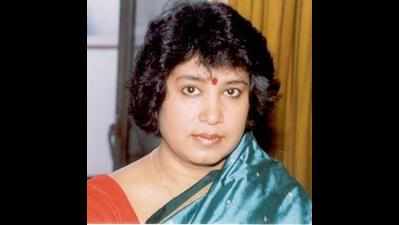Trending
This story is from November 6, 2016
Intellectuals speak out against extremism
Canacona: Highlighting the Dhaka cafe attacks as an acute indicator of the rise in religious extremism in Bangladesh, noted writer Tasleema Nasreen said that Islam would need to go through an enlightenment process to weed out the unscientific aspects of it.

<p>noted writer Tasleema Nasreen said that Islam would need to go through an enlightenment process to weed out the unscientific aspects of it<br></p>
CANACONA: Highlighting the Dhaka cafe attacks as an acute indicator of the rise in religious extremism in Bangladesh, noted writer Tasleema Nasreen said that Islam would need to go through an enlightenment process to weed out the unscientific aspects of it.
“The young boys who hacked people to death in Dhaka were solely driven by religion,” she said at the India Ideas Conclave, at Canacona, on Saturday.
Rajya Sabha MP from West Bengal Roopa Ganguly lashed out at the media for not giving balanced coverage to events related to dissent and political oppression.
“In Bengal, there have been instances where a ruling party’s workers have beaten people by merely claiming that they owe allegiance to the opposition. Nobody has reported them,” she alleged.
“Social media has taken over the role of dissenter and the outcry of an Emergency-like situation is due to the fact that the current PM has taken it up on himself to decide the narrative of the country,” Agnihotri said, adding that selective dissent is more harmful than productive.
The panelists also emphasized on the fact that the policies of the Narendra Modi-led government couldn’t be viewed as black and white.
Educationist Mohandas Pai, speaking on the issue of quality of education in the country, stated that initiatives like Digital India could help salvage an otherwise gloomy Indian education scenario. “We need to equip our children with a tablet and pre-installed software in their choice of languages. Technology has to be the driving force of the Indian education sector,” he said.
Vice-chancellor of the Jawaharlal Nehru University, Mamidala Jagadesh Kumar, added that there is scope to change the evaluation system to improve learning among students.
“Cases of mass-copying and cheating happen because of undue importance on grades. We should conduct more open-book examinations and allow students to discuss and solve questions because it serves the purpose of making them grasp concepts,” Kumar said.
Later in the evening, Union minister for commerce and industry, Nirmala Sitharaman, said that the Narendra Modi-led government is working to disrupt the status quo.
“Our government has come with the mandate. In this government, the Cabinet meetings are always churning out ideas. It is not that any agenda is set before us, which we talk about and go away.”
“The young boys who hacked people to death in Dhaka were solely driven by religion,” she said at the India Ideas Conclave, at Canacona, on Saturday.
Rajya Sabha MP from West Bengal Roopa Ganguly lashed out at the media for not giving balanced coverage to events related to dissent and political oppression.
“In Bengal, there have been instances where a ruling party’s workers have beaten people by merely claiming that they owe allegiance to the opposition. Nobody has reported them,” she alleged.
Similar allegations were raised by filmmaker Vivek Agnihotri, who said that mainstream media has lost the narrative and social media is the new dissenter.
“Social media has taken over the role of dissenter and the outcry of an Emergency-like situation is due to the fact that the current PM has taken it up on himself to decide the narrative of the country,” Agnihotri said, adding that selective dissent is more harmful than productive.
The panelists also emphasized on the fact that the policies of the Narendra Modi-led government couldn’t be viewed as black and white.
Educationist Mohandas Pai, speaking on the issue of quality of education in the country, stated that initiatives like Digital India could help salvage an otherwise gloomy Indian education scenario. “We need to equip our children with a tablet and pre-installed software in their choice of languages. Technology has to be the driving force of the Indian education sector,” he said.
Vice-chancellor of the Jawaharlal Nehru University, Mamidala Jagadesh Kumar, added that there is scope to change the evaluation system to improve learning among students.
“Cases of mass-copying and cheating happen because of undue importance on grades. We should conduct more open-book examinations and allow students to discuss and solve questions because it serves the purpose of making them grasp concepts,” Kumar said.
Later in the evening, Union minister for commerce and industry, Nirmala Sitharaman, said that the Narendra Modi-led government is working to disrupt the status quo.
“Our government has come with the mandate. In this government, the Cabinet meetings are always churning out ideas. It is not that any agenda is set before us, which we talk about and go away.”
End of Article
FOLLOW US ON SOCIAL MEDIA










